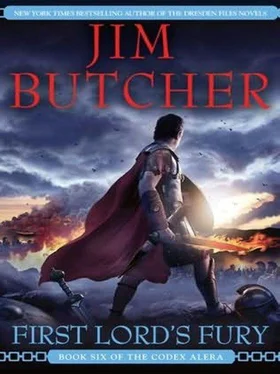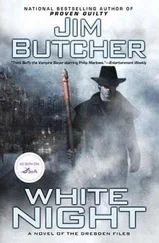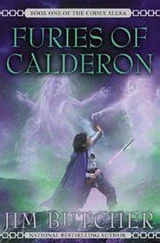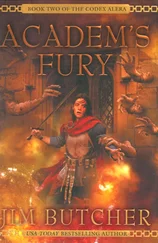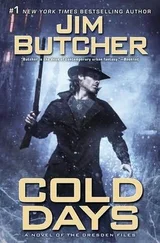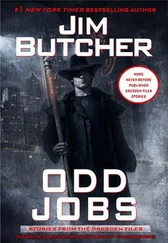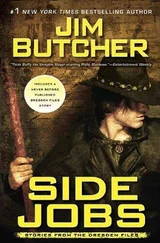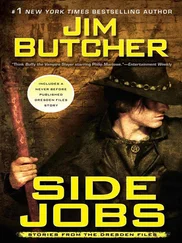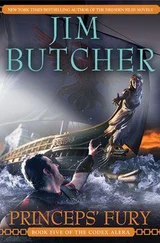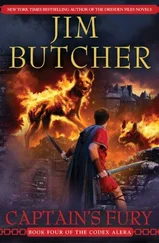“Yes,” Tavi said, showing his teeth. “And if she’s afraid of me interfering, it means that I can .” He nodded firmly. “Every important fight I’ve ever been in was against someone bigger and stronger than me. This is no different.”
Alera’s gemstone eyes glittered. “If you say so, young Gaius.” And she was gone.
Tavi stalked out of the healer’s tent.
Twenty legionares snapped immediately to attention. Another sixty, within the immediate circle of light, came hustling off the ground, some of them rousing from (fully armored, fully uncomfortable) sleep to do it. Every legionare in sight bore the symbol of First Aleran, the eagle upon the field of scarlet and silver—but the design had been blackened and subtly altered into the shape of a crow. The Battlecrows had been the cohort who had followed Tavi into the horrible business at the end of the Battle of the Elinarch, and ever since they had maintained a reputation for discipline, absolutely deadly efficiency on the battlefield, and reckless disregard for danger. In most Legions, men sought to gain promotion to the Prime Cohort, traditionally the cohort composed of the Legion’s most experienced (and highest-paid) soldiers. In the First Aleran, men strove very nearly as hard to be accepted into the Battlecrows, the cohort that most often followed the captain into the deadliest portions of the battlefield.
Eighty men slammed their armored hands into their armored chests at the same instant, like a report of mortal thunder.
“Schultz,” Tavi called quietly.
A centurion strode out of the ranks, a soldier younger than Tavi himself. Schultz had come a long way since the Elinarch. He’d grown half a foot, for one thing, and added sixty pounds of muscle to the frame of a youth. His face and armor both bore scars, and he had discarded the helmet crest that denoted him as something other than a legionare , but he walked with erect pride and carried his baton beneath his arm in the best tradition of Legion centurions. He snapped off a precise salute to Tavi. “Sir.”
“We’re leaving,” Tavi said.
Schultz blinked. “Sir? Do you want me to round up the command officers for you?”
“We’re not waiting that long,” Tavi said. “The vord Queen knows where we are, and we’re going to be somewhere else as soon as possible. I need runners, Schultz, to go to each cohort’s Tribune and bear my personal command to break camp. I want to be on the road in no more than an hour. Anyone who can’t be ready to go will be left behind. Understood?”
Schultz looked dazed. “Ah. Yes, sir. Runners to each Tribune, your personal command to break camp, moving in an hour or left behind, sir.”
“Good man,” Tavi said. He turned to the assembled century of men and raised his voice. “The Legions have a long tradition, boys. You march hard and fast and show up in places where no one expects you—and then you go to work.” He grinned. “And you do it all carrying a hundred pounds of gear made by whoever did it for the least coin—but every one of those slives gets paid better than you! It’s tradition!”
A growl of laughter went around the group of soldiers.
“This march,” Tavi said, “is different.”
He let silence sit over the men for a moment.
“In a moment, you’re going to go out and give the orders to move out. And you’re going to tell the men this: No packs. No tents. No blankets. No spare boots. They don’t matter anymore.”
The silence thickened.
“We have to move, fast and hard,” Tavi said. “There are millions of lives at stake, and the enemy knows where we are. So we’re not going to be here. We’re going to be in Calderon by tomorrow, a full day before we’re expected. And then we’re going to find the vord Queen and pay the bitch back for what she did tonight.”
Eighty men raised their voices in a sudden, furious roar of approval.
“Schultz will give you your assignments,” Tavi said. “Get it done.”
Another roar went up, and Schultz began striding down the ranks, striking each man lightly on his armored shoulder with his baton and issuing the name of an Aleran or Canim officer he was to contact. The men went sprinting into the dark, and within minutes trumpeters were sounding the signal to prepare to march.
“Sir,” Schultz said, after he’d sent the last of the men off, “we might make Calderon that fast. But the Canim can’t, sir, nor their beasts. There’s no way.”
Tavi showed the legionare his most Canish smile. “Faith, Schultz,” he said. “Where there’s a will, there is a way. And my will is for us all to be in Calderon by the sunrise after next.”
Schultz blinked. “Sir?”
“Get the rest of the ’Crows ready to move out, Schultz,” he said. “That’s your job. Getting all of us there? That’s mine.”
The vord came precisely when Invidia said they would. Sunrise was still four hours away, and once the moon had vanished behind the mountains to the south, the night turned as black as the inside of a coffin.
Amara was on the wall, waiting to see if Invidia had spoken the truth. There was no warning whatsoever. In one moment, the night was completely silent and still. In the next, there was a single flicker of movement at the very edge of the ground illuminated by the wall’s furylights, then the gleaming black chitin of the horde exploded from the night, rushing across the ground in the rumble of millions of feet striking the still-scorched earth.
They must have moved slowly and silently until they reached the edge of the lights, Amara thought. No Aleran Legion could possibly have moved stealthily in such vast numbers—but it hadn’t done them any good. The legionares on the walls were ready and waiting.
Hundreds of Citizens brought up the flickering curtain of fist-sized fire-spheres that had first been used at Riva. It proved just as deadly to the foe here as it had at the great city. Vord surged into the burned zone before the wall and were slain in blasts of fire and superheated air, a million deadly fireflies barring their way. The horde died by the hundreds, then the thousands, but as they had at Riva, the weight of numbers began to let the vord grind their way forward, scrambling over the corpses of their fallen comrades, laying a road of death and twitching limbs for those coming behind them.
Within moments, the vord had paid the necessary toll, and the Aleran firecrafters who lined the walls began to crumple down, exhausted. As they did, they were replaced with every Knight Flora in the Legions, and every Citizen with the necessary skills to join them. Arrows began to leap from bows, their fury-enhanced limbs sending the shafts leaping forward with supernatural power.
Deadly arrows hissed through the night, with the Knights Flora working in teams of ten and twenty, sharing targets with shouts of coordination, each archer loosing as fast as he could. Hundreds of streams of arrows slewed back and forth across the vord lines, like the sprays of water used by fire wardens in cities all across Alera.
In many ways, Amara supposed, fighting the vord was a great deal more like battling a fire than an enemy. They rushed forward with the same implacable need to devour and spread. The streams of arrows would beat back the vord where their deadly skill touched them, but wherever a stream hadn’t swept for a few seconds, the vord surged forward again, like a blaze chewing through an old wooden building—just as determined, and just as unstoppable.
Amara licked her lips, her heart beating faster, as the first vord mantis reached the wall and began gouging out fresh climbing holds. Archer teams began withdrawing, leaving heavily armed legionares to take their places.
Читать дальше
